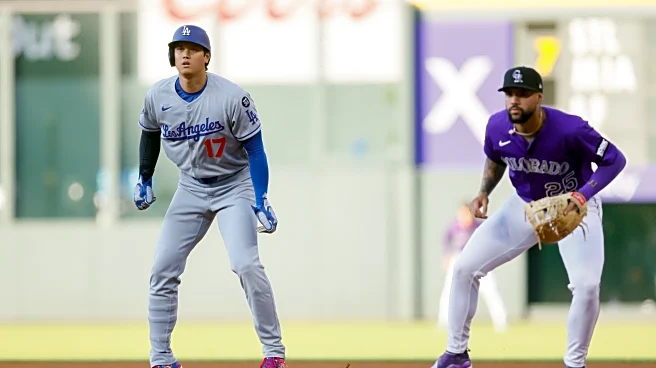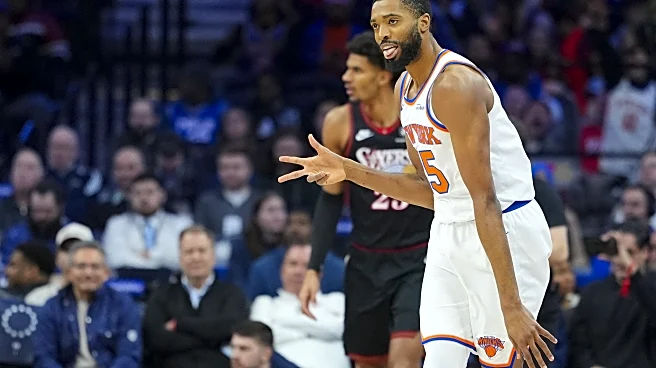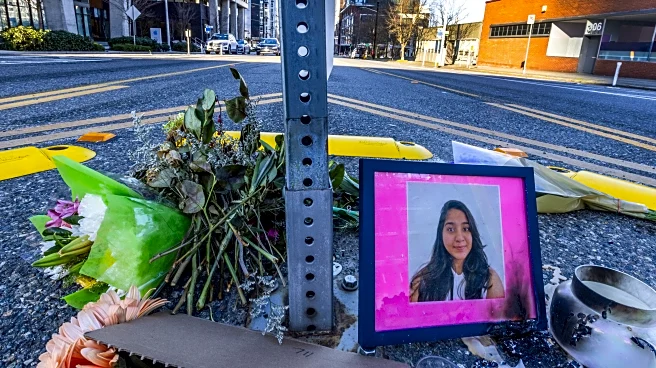Major League Baseball Commissioner Rob Manfred caused quite a stir in the baseball world over the weekend when talking about a window into the future concerning expansion.
He hopes to have the wheels set in motion for expansion by the end of his term in 2029, adding two expansion teams to allow both leagues to have 16 teams. The addition of new teams presents an opportunity for realignment that Manfred envisions.
“I think if we expand, it provides us with an opportunity to geographically realign,”
Manfred said. “I think we could save a lot of wear and tear on our players in terms of travel. And I think our postseason format would be even more appealing for entities like ESPN, because you’d be playing out of the east and out of the west.”
There is quite a bit of debate to have about the logistics and merits of what Manfred was talking about during the clip above. Certainly, reducing wear and tear on players and making travel a bit easier would be helpful, but simply approaching it when the caveat of appealing to West Coast and East Coast markets sours things a bit.
The idea of potentially manufacturing new geographical rivalries or re-inventing existing ones with new division alignments won’t necessarily have the same impact. The rivalries between the New York City teams and the Chicago teams work so well because they are in different leagues entirely.
Still, this isn’t to say that alignment into eight four-team divisions isn’t a bad idea. It simply has to be executed well to benefit the game and the teams getting moved around.
Which brings us to the Colorado Rockies and how a realignment could affect the team.
Division Background
The Rockies are the odd duck geographically in MLB. They are the only team fully in the Mountain Time Zone, while their division consists of three California teams and the Arizona Diamondbacks.
When they joined the league in 1993, there were only four divisions, an East and a West in each league, consisting of seven teams each. The NL West featured the staples of the San Francisco Giants, Los Angeles Dodgers, and the San Diego Padres, along with the Cincinnati Reds, Houston Astros, and the 1993 Division-winning Atlanta Braves.
1994 saw MLB adopt the current three-division structure, although both west divisions only had four teams, while the other four had five teams. When the Diamondbacks were established in 1998, they rounded out the NL West to five teams, while the other divisions still had some imbalance. The six divisions would finally even out in 2013 when the Astros moved to the AL West to give them five teams in the division.
Division Success
As members of the NL West, the Rockies have had their fair share of struggles. In their 30-plus years in the division, the Rockies have never won the division crown. All five of their playoff appearances have come via the Wild Card. They have regularly finished in the bottom of the division and well behind first place.
The team has fallen behind in recent years in the spending game, contrary to the other teams in the division. In total payroll allocations, four of the five NL West teams rank in the upper half of the league in spending, while the Rockies are 21st. It’s not to say spending makes all the difference, but the Rockies’ lack of quality spending and development has left them in the dust. Combine that with the on-field struggles against these teams, and the Rockies have not done well in the division, save for a handful of times.
Division Realignment
So what could happen to the Rockies should realignment happen? Scouring the internet, I’ve gathered that the conclusion so far is that the Rockies would be taken out of the NL West. Where exactly they end up is where opinions seem to differ. Some kept the classic AL and NL separation, while others went all in on making geographical proximity the main priority.
Maury Brown of Forbes came up with a bit funkier idea. He conceptualized a Northwest Division that would include the Rockies, the Giants, the Seattle Mariners, and a hypothetical expansion team in Salt Lake City, UT.
Back in 2023, former general manager Jim Bowden came up with a Pacific Northwest Division for the Rockies. It follows the same logic as Brown’s, only the difference is that the Athletics would be involved instead of an expansion team. Of course, the future of the A’s is still unclear, whether they will be in Las Vegas or still be in California.
Mike Axsia of CBS Sports moved the Rockies into the Central Division with the St. Louis Cardinals, Kansas City Royals, and an expansion team, which he chose to be in Nashville, TN.
Perhaps the concept that I find most intriguing and most plausible among the ideas I’ve seen is Stephen Nesbitt’s for The Athletic. His proposal retains the AL and NL designations but changes the divisions into the four cardinal directions, much like the NFL.
What I like about Nesbitt’s projection is that it does very little to change things across the league. The biggest change is obviously the new AL South, which groups the Rockies with the Astros, Royals, and Texas Rangers. Meanwhile, the most likely expansion team candidates fit neatly into their divisions and Nesbitt remedies some geographical issues by moving Pittsburgh and Tampa Bay into more reasonable spots.
Looking at a map, that AL South division makes a lot of sense for the Rockies. The Royals are closer in proximity to the Rockies than any team in the NL West currently. The Astros and Rangers are much different from what the Rockies currently do travel-wise in the division, but it still makes more sense in the grouping than going to California.
Division Future
For years, it has felt like the Rockies would greatly benefit from division realignment. It wouldn’t change their fortunes, persay but it may instill a more generally positive outlook for the team.
It’s easy to look at the current NL West and cut your losses at the idea of reaching the postseason via a Division title. Rather than just trying to compete against the parity of the five-team race, the Rockies have had to keep an eye towards the Wild Card race, which still involves a lot of good teams.
The Texas teams or any of those Central Division teams offer a nice contrast and a better mold for the Rockies to follow. They aren’t the biggest markets, falling more in line with Colorado, which could give the Rockies a bit more incentive to try harder. Not having to spend so many games at sea level in California could also help the Rockies combat the drastic effects of hitting on the road and allow pitching to find a bit more consistency, or at least make the changes more manageable.
Division realignment won’t solve all the Rockies’ problems, but it could help them out in the future. Sometimes a player just needs a change of scenery to find success, and the same could be said for a franchise going to a new division.
What are your thoughts and ideas about the prospects of division realignment? Sound off in the comments below!
On the Farm
Triple-A: Albuquerque Isotopes 9, Las Vegas Aviators 3
Germán Márquez made his first rehab start with Albuquerque and looked solid through his three innings of work. His only blemish was a solo home run allowed to Jacob Wilson in the third. The Isotopes answered back with a three-run bottom of the inning and later with a five-run bottom of the seventh. Zac Veen went 2-for-5 with a home run while Sam Hilliard had three hits with a home run. Owen Miller had a great night offensively, tallying three hits and four RBI, including a grand slam.
Double-A: Hartford Yard Goats 5, Somerset Patriots 0
Roc Riggio had a solid day against his former team, going 2-for-4 with a double and RBI as the Yard Goats blanked Somerset. Hartford scored all five runs in the second and third innings, tallying eight hits on the night. Charlie Condon drew a pair of walks while six other Yard Goats had at least one hit. McCade Brown cruised through six innings, allowing just one hit and striking out eight batters. Welinton “Beef” Herrera threw two scoreless and Bryce McGowan closed out the game with a scoreless ninth.
High-A: Spokane Indians 10, Everett AquaSox 7
A three-run top of the ninth proved the difference maker for the Spokane Indians as took home the victory. Max Belyeu continues the hot start to his professional career with two hits, including slugging a three-run home run in the third inning, his third home run of the season. Blake Wright also hit a home run as part of his two-hit day. Griffin Herring threw five solid innings, giving up two runs on two hits, but he did walk four while striking out eight.
Low-A: Fresno Grizzlies 8, San Jose Giants 5 (F/11)
It took extra innings, but the Fresno Grizzlies managed to snag the win by scoring three runs in the top of the 11th. Fresno took a 5-0 lead in the top of the third, but couldn’t add on as San Jose eventually tied things in the bottom of the ninth. Tanner Thach led the charge on offense, tallying two hits and driving in three runs. Roldy Brito, Derek Bernard, and Roynier Hernandez also had two hits on the night. Manuel Olivares made the start and cruised through five scoreless innings. Also worth noting that Ethan Holliday had a rough night, going 0-for-5 with four strikeouts.
Affected by Altitude Episode 175: This Rockies Season Has Been Bananas | Rocky Mountain Rooftop
In this week’s podcast, Evan Lang and I talk about the Savannah Bananas at Coors Field, the can-do attitude of the young core, and the troubled future of the starting rotation. I also expound on the wonders of Colorado produce, much to Evan’s surprise.
Get to know prospect reliever Bryson Hammer a little better, who has had a good bit of success this season in the minors between Fresno and Spokane.
Please keep in mind our Purple Row Community Guidelines when you’re commenting. Thanks!
















